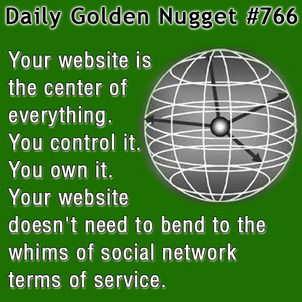 Websites and Social and Apps, oh my... There are so many options for advertising your business in this digital age that it's no wonder that business owners don't know where to start.
Websites and Social and Apps, oh my... There are so many options for advertising your business in this digital age that it's no wonder that business owners don't know where to start. Last week I attended a small business presentation at a very large law firm in NYC. The presentation covered all the legal issues a small business, or a new business needs to consider before launching an e-commerce website. I had the opportunity to talk with many small business owners who were all looking for recommendations on where to start, and they were wondering if e-commerce was a good starting point for them.
In reality e-commerce is not usually a good starting point for small retail store businesses. I'm going to define a small retail store as a business with less than 15 employees. On the other hand, e-commerce is good for business start-ups, but only if you've established a supply chain and fulfillment procedures for being an e-tailer.
All small business owners should have a website by now, but the reality is that many do not. Google even has a "Get Online" initiative for small business to help take those first few steps. The question I hear a lot, and indeed the main question at last week's presentation, was if a website is actually needed, of can a small business simply use all the free services available online.
Free online services include all the social networks, smartphone apps, and marketplace websites like Amazon.com. You could easily establish an online identity within those, and many businesses do thrive by using them.
Facebook has become the ubiquitous social network and you can find a way to use it for your retail business. You can set up Facebook applications for e-commerce, blogging, customer notifications, contests, and a lot more very easily. From a quick overview it appears that Facebook is the best option for small business to establish an online identity.
On the other hand, so many people have smartphones that it seems like a good idea to make your own smartphone application. This is not as easy as setting up a Facebook identity, but there are companies out there, like mobileroadie.com, that provide easy methods to create and maintain an app.
When a small business compares the startup and long term maintenance costs of social networks and mobile apps to the costs of a website, the website will always loose. Websites are costly and time consuming to build correctly and maintain over the long term, but they are far more profitable when done correctly.
The real difference between social networks, mobile apps, and a website comes down to one thing: ownership. You have full control over your website, all the terms of service and usage that you set forward, and how you use it. With social networks you are subject to the changing whims of that network. Facebook changes their terms a lot, and many people refuse to use Facebook simply because of their privacy policies.
You might think that you own your smartphone app, especially since you hired someone to program it for you, but Apple, Google, and Microsoft have very specific rules over what your apps can and cannot do. Most businesses won't feel limited by those rules, but before you create an app you should always make sure that your creative idea is actually allowed.
Your website really should be the center of your digital world. You set the rules and customers must follow them. You can be as creative as you want and even build your own applications for e-commerce, blogging, customer notifications, and contests without worrying that you will get shut down by a social network. Everything you do on your website should be shared to the social networks. You can even create smartphone apps that pull information from your website.
With that approach you can control everything, and make changes to your marketing when needed.
If you spend years building your presence on a social network, like many did with MySpace, you will find yourself out of business when the next best network comes along. But with a website all you have to do it change your online activity and how you share information.
There is one large caveat with building your own website, and that's tracking. You have to track how people use your website and how they find your website. Start with Google Analytics tracking as you start small. Then talk to your website programmer to find out about other types of tracking that will help build your business.
The bottom line is that your website is the center of everything. You control it. You don't control social and you don't control the smartphone app markets.








